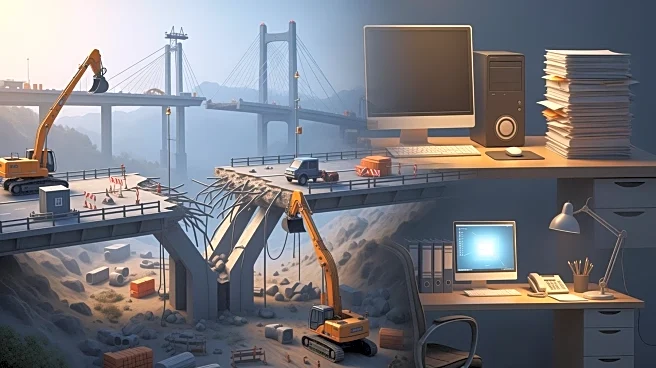What's Happening?
The U.S. government shutdown has reached its 17th day, with significant impacts on federal workers and infrastructure projects. President Trump's administration has announced a pause on over $11 billion
in infrastructure projects managed by the Army Corps of Engineers in cities such as New York, San Francisco, Boston, and Baltimore. These projects, deemed 'lower-priority,' are at risk of cancellation. The shutdown has also led to concerns about federal workers, including military personnel, missing paychecks. The Pentagon managed to cover the October 15 payday for active-duty troops, but future payments remain uncertain. The Supplemental Nutrition Assistance Program (SNAP) is also at risk, with potential funding shortfalls affecting 42 million beneficiaries in November. The U.S. Supreme Court will continue its essential functions but will close its building to the public due to funding constraints.
Why It's Important?
The ongoing government shutdown has far-reaching implications for U.S. infrastructure, federal employees, and social services. The pause in infrastructure projects could delay critical developments in major cities, affecting local economies and job markets. Federal workers, including military personnel, face financial uncertainty, which could impact morale and operational readiness. The potential shortfall in SNAP benefits threatens food security for millions of Americans, highlighting the shutdown's impact on vulnerable populations. The situation underscores the political stalemate in Congress, with significant consequences for public policy and governance.
What's Next?
The Senate is scheduled to vote on October 20 to potentially end the shutdown, but previous attempts have failed to garner the necessary support. The outcome of this vote will be crucial in determining the immediate future of federal operations and funding. If the shutdown continues, further disruptions to government services and infrastructure projects are likely, with increasing pressure on lawmakers to reach a resolution. Stakeholders, including political leaders and civil society groups, may intensify their efforts to advocate for a compromise to restore government functions.
Beyond the Headlines
The shutdown highlights deeper political divisions and the challenges of bipartisan cooperation in the U.S. government. The decision to pause infrastructure projects in Democrat-led cities may be perceived as politically motivated, potentially exacerbating partisan tensions. The impact on federal workers and social services raises ethical concerns about the government's responsibility to its employees and citizens. Long-term, the shutdown could influence public perception of government effectiveness and trust in political institutions.











